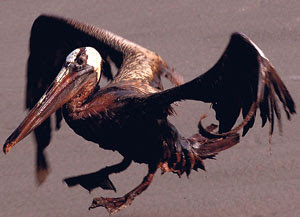
A brown pelican coated in heavy oil tries to take flight June 4, on East Grand Terre Island, Louisiana. AFP
Over at The Big Picture, a Boston Globe production, AP Photographer Charlie Riedel posted 8 striking images of seabirds caught in the oil slick off of Louisiana's East Grand Terre Island.
I entertain visions of towering, animated Dawn dish detergent bottles frolicking up and down choreographed lines of khaki-panted, super-dedicated volunteers -- from all walks of life! representing every state in the union! -- scrubbing and rinsing, wiping and dipping the oiled plumage of all the seabirds damaged by the BP spill in the gulf.
Oh, and singing. There is also singing. You know, to go with the frolicking.
I first grew suspicious of my imagination when a wildlife organization down in Sarasota [Save our yadda-yadda, 501(c)] announced that there was no further need for volunteers to help rescue oiled wildlife. They followed this non-appeal with a failure to ask for funds. [Remember, BP is to foot the entire "clean-up" bill, so your donations now to wildlife charities will fund other disasters later!]
Earlier on in the crisis, there were requests for sheets, heating pads, paper towels, and pet kennels. And Dawn, of course. In this video, International Bird Rescue Research Center Director Jay Holcomb reflects on how a dish washing detergent became the number one tool for cleaning oil from wildlife. (Video is from April 2010)
In the 1950's and 60's, "different substances were applied to the feathers of oiled birds, some of which were: mascara remover, butter, lard, powdered chalk, waterless hand cleaner, acetone, detergent and various oils," notes Holcomb. It boggles the mind, but in the 70's, there was a spell where applying corn meal on top of warmed mineral oil (underneath all of which was the poor bird) seemed an excellent idea.
It turns out that there actually is a bird-washing machine, but that the machine is considered not quite as efficacious as a human armed with you-know-what. This YouTube video from December 2009 features a bird-washing machine that employs "a new detergent" that purportedly strips out the hydrocarbons but not the natural oils needed by the feathers. IBRRC Director Holcomb is adamantly opposed to the use of these machines. He relates their disastrous use in France, following the Erika spill:
Each time, the birds' wings were injured and the birds died. Our biggest concern is that it does not take into consideration the individual needs of each bird. Animals cannot be cleaned like apples. They come in different shapes and sizes, even within species, and therefore require individual care and cleaning.
[The financial relationship between the IBRRC and Procter & Gamble seems to be limited to one of mutual fund- and awareness- raising, but I honestly haven't checked into it. Somehow I doubt the existence of a subterranean ploy by P&G to corner the bird-washing market...]
With this oil spill, my imagination has finally failed me.
We have surely failed the most innocent victims of our environmental crimes.
And now we must ask ourselves whether the photogenic hand-washing of oiled wild life is just a means to feel better, to assuage our guilt.
An article published today in Der Spiegel online clearly voices what has been murmured for decades by the scientific community -- that euthanasia makes more sense than the elaborate but largely futile efforts at bird-washing:
A German biologist says that efforts to clean oil-drenched birds in the Gulf of Mexico are in vain. For the birds' sake, it would be faster and less painful if animal-rescue workers put them under, she says. Studies and other experts back her up.
"Kill, don't clean," is the recommendation of a German animal biologist, who this week said that massive efforts to clean oil-soaked birds in Gulf of Mexico won't do much to stop a near certain and painful death for the creatures.
Despite the short-term success in cleaning the birds and releasing them back into the wild, few, if any, have a chance of surviving, says Silvia Gaus, a biologist at the Wattenmeer National Park along the North Sea in the German state of Schleswig-Holstein.
"According to serious studies, the middle-term survival rate of oil-soaked birds is under 1 percent," Gaus says. "We, therefore, oppose cleaning birds."
I may be getting old and cold.
Or maybe I am tired of being fooled, and of being a fool in the world.
We owe our best to the species that we harm and destroy, so a serious conversation about what constitutes our best is long overdo. Unfortunately, when a hard conversation needs to take place in this Land of Large, we disguise our avoidance as grand benevolence. Because we are able to both wash the oiled wildlife and fund habitat rehabilitation, we allow our fuzzy focus to continue uncontested.
(Fodder for future pieces, let me send up this trial balloon: I venture that this tendency we might prefer to call generosity is also what fuels opinions that name us naive, that peg us, kindly, as in denial; Less kindly, I've heard Americans called dangerous, and our various stupidities, choices.)
This article by John Flesher and Noaki Schwartz with AP fleshes the issue out nicely, and includes a response from the animal-rescue community: Rescuing oiled birds: Poignant, but is it futile?


